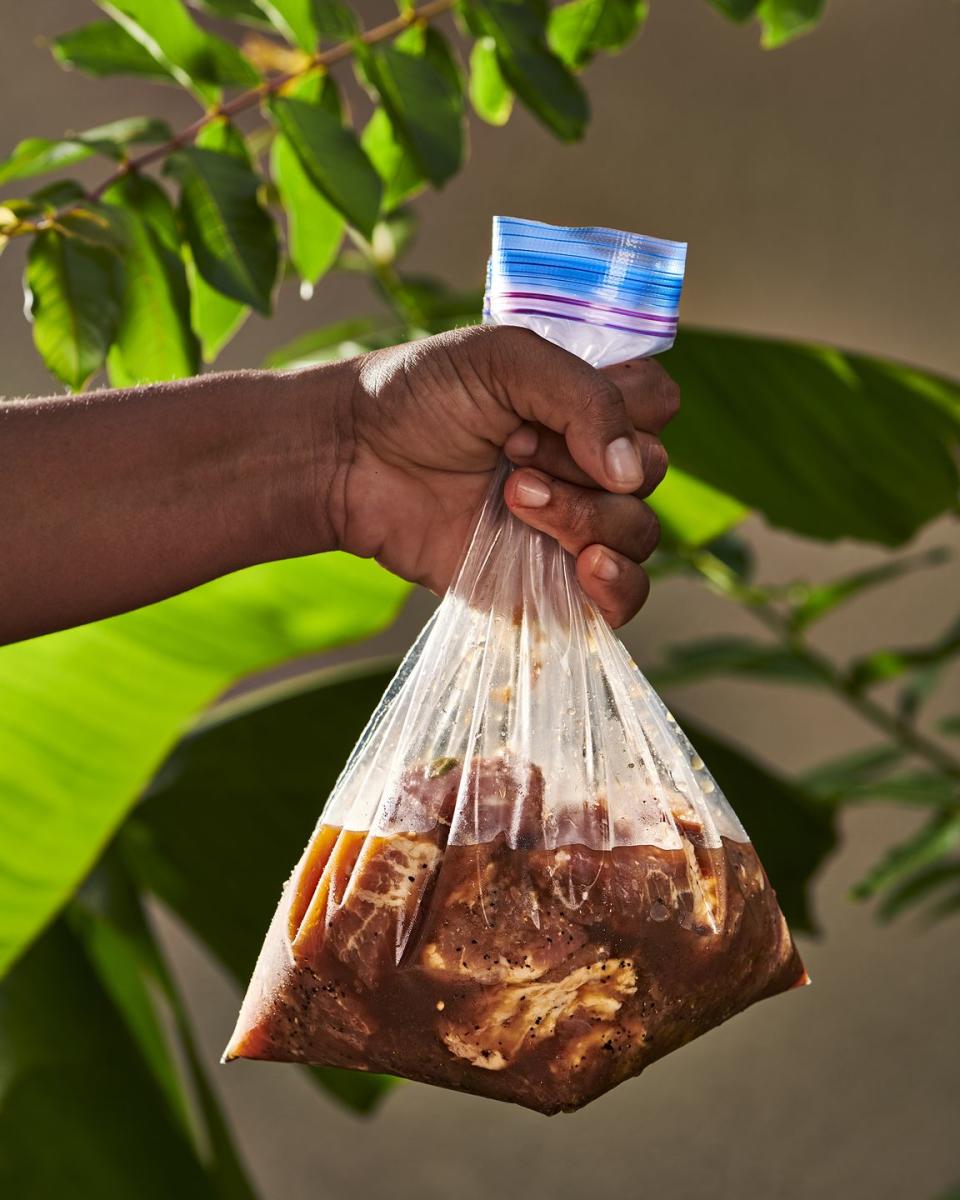4 Tips For Making The Best Marinades Ever

"Hearst Magazines and Yahoo may earn commission or revenue on some items through these links."
A shower of salt and pepper is the ultimate way to season a steak, but it’s not the best option for other cuts of meat. Ribs, roasts, barbecue chicken, and bone-in pork chops, for example, all benefit greatly from hours in a flavorful marinade. If we limit ourselves to dry seasonings applied just before cooking, we’re losing out on worlds of deep flavor.
In her recently published cookbook, Islas: A Celebration of Tropical Island Cooking, Von Diaz shares recipes and cooking techniques from tropical island cultures around the world. She showed us everything we need to know about marinades and how to take a cue from island cuisines to get more flavor into our meat. She also shared her must-try recipe for CHarmoru Barbecue Chicken.
Here's What Your Marinade Is Doing
A marinade has two purposes: to season and tenderize. While a quick sprinkling of salt and spices on a chicken breast might flavor the outside, Von says that marinades do so much more. “Through the combination of acid, aromatics, a little bit of fat, and seasoning, marinades actually literally penetrates the muscle of the meat,” she says. They thoroughly infuse your meat with flavor.

A marinade also tenderizes cheap cuts of meat by partially breaking down their tougher muscle structure, making them more delicious. According to Diaz, this makes it a great “cheat for tough cuts of meat, which are often more affordable.” In other words, marinading is a smart, cost-effective way to cook.
How To Build a Marinade You Love
You don’t need a recipe to make an amazing marinade. According to Diaz, a marinade is composed of “three key ingredients” in addition to salt: “acids, aromatics, and oils.” Any combination of ingredients from these categories, when used in the right ratio, can create a marinade. This makes marinades endlessly customizable. “I really encourage people to play with the ingredients they like," Diaz says.
Diaz's golden marinade ratio is 1 part acid(s) to 1 part aromatics and spices to 3 parts oil by volume. Here’s how these categories break down:
Your Marinade Needs Acid
Acid is key in a marinade because it tenderizes the meat on a chemical level. Most of us might immediately jump to lemon or lime juice, but according to Diaz, there are a lot more options, including “vinegars, citrus, fruit, and yogurt.” We also shouldn’t feel confined to using just one acidic ingredient per marinade. Diaz has a mix of citrus fruits in the refrigerator, and she shares that she likes to use them in tandem for a more interesting flavor.
Your Marinade Needs Aromatics & Spices
These bring a punch of flavor to any marinade. Fresh ingredients such as garlic and ginger work together with ground spices to create a dynamic seasoning that will permeate the meat. Diaz especially loves using green onion in her marinades (“it’s oniony, but a little bit (more) delicate”), but she also urges everyone to use “the aromatics that you like” to create a marinade that you love.

Your Marinade Needs Oil
Fat is important because, even though it’s a “not a flavor agent” it is a “lubricant and a binder.” In other words, it prevents meat from sticking to whatever cooking surface is used, and it also helps distribute and carry all the rest of the flavors. Vegetable oil and olive oil are common options, but you can use any oil you like, provided it can withstand high heat. Diaz prefers avocado oil: “it’s really healthful in terms of (working with) high heat” and it has a “neutral flavor”—all with the side benefit of being “good for your body.”
Taste Your Marinade
Before pouring the marinade over your meat, Diaz has one last note. “Taste it!” she says. “Just put your finger in it.”
This might sound odd, but think about it: if you love the flavor of the marinade, you’ll love it on the meat. If you’re not a fan of it, this is the time to course-correct. Add a little more salt, increase other seasonings, and taste it again. Once it’s on the meat, you can’t make more adjustments.
How Long Should Meat Sit in a Marinade?
There’s one final ingredient in this equation: the amount of time it should sit on the meat. According to Diaz, “The time varies depending on two factors: the ingredients in your marinade and the protein itself.”
If your marinade has a lot of super strong flavors, such as soy sauce and a lot of acid, it’s smart to shorten the marinade time. If you’re using more “delicate proteins and vegetables” such as fish or vegetables, you shouldn’t marinade longer than an hour or so, since “the marinade can overpower them if they sit in (it) too long.” Tougher cuts of beef or pork, on the other hand, can go as long as overnight.
“Growing up [in Puerto Rico and the American South] I never ate a piece of meat that wasn't seasoned—really seasoned," Diaz says. Follow her lead and the example of tropical island cultures, and you won’t either.
Want more from Von Diaz? Check out her recipe for CHarmoru Barbecue Chicken and Field Notes from Latin American Kitchens.
You Might Also Like

